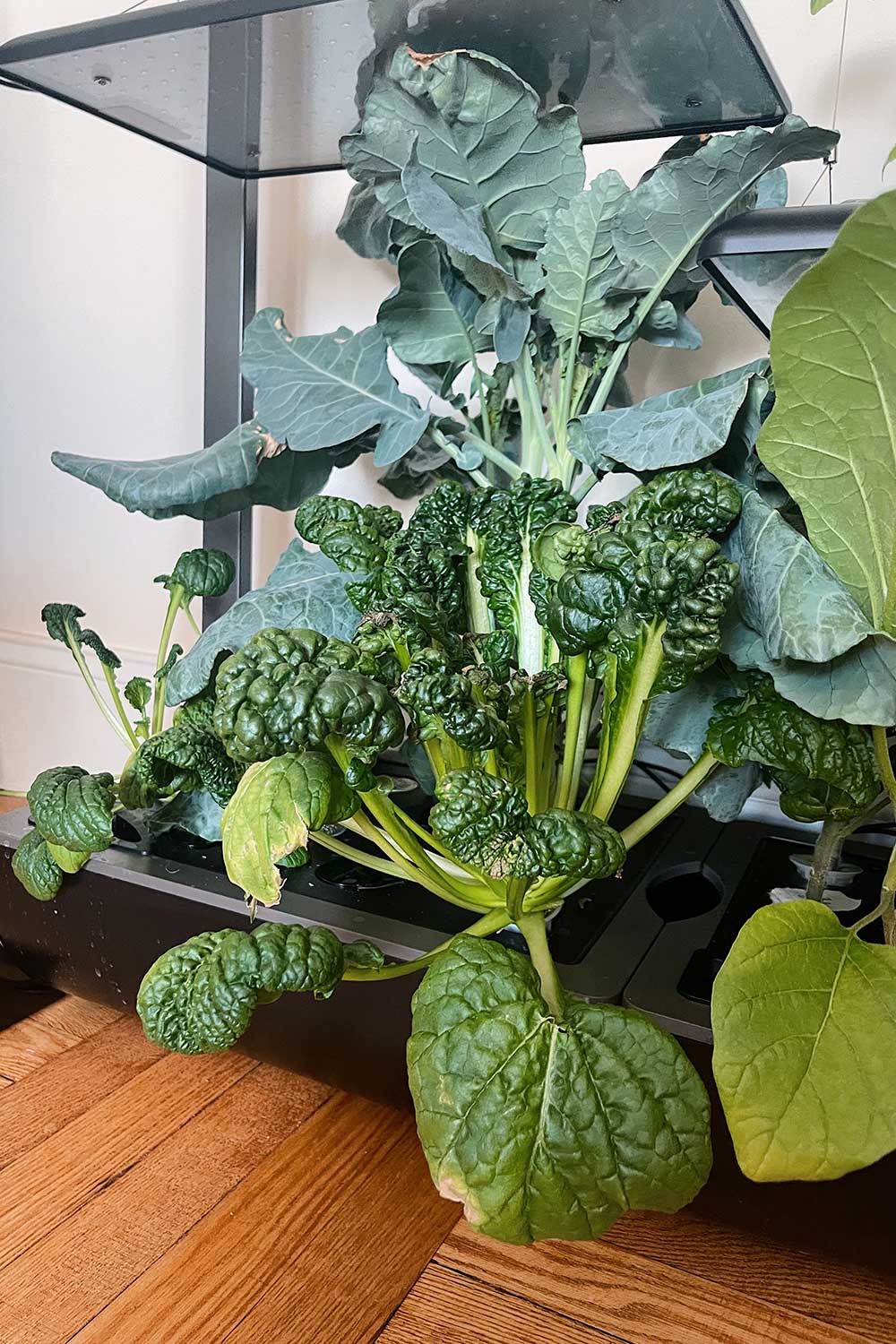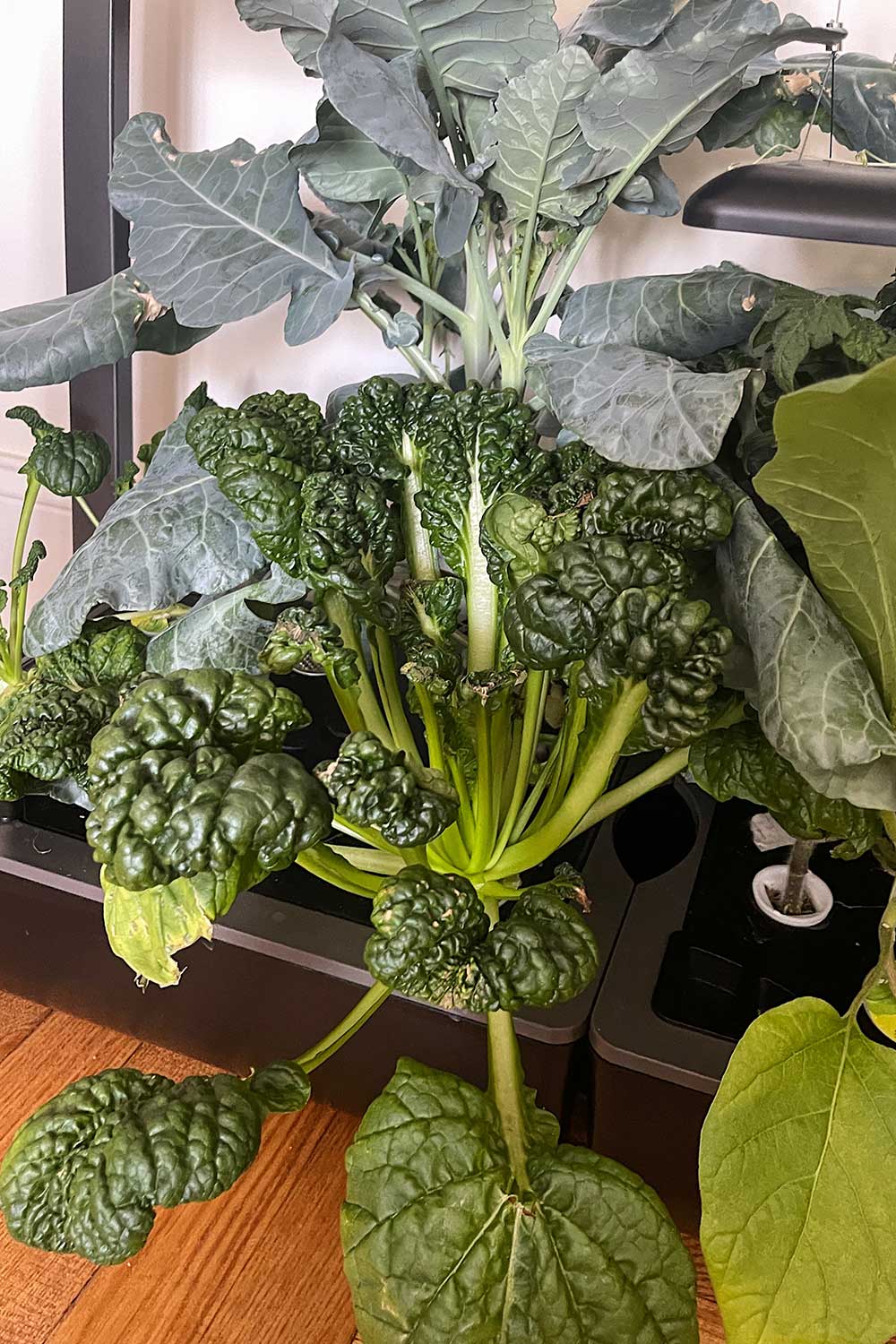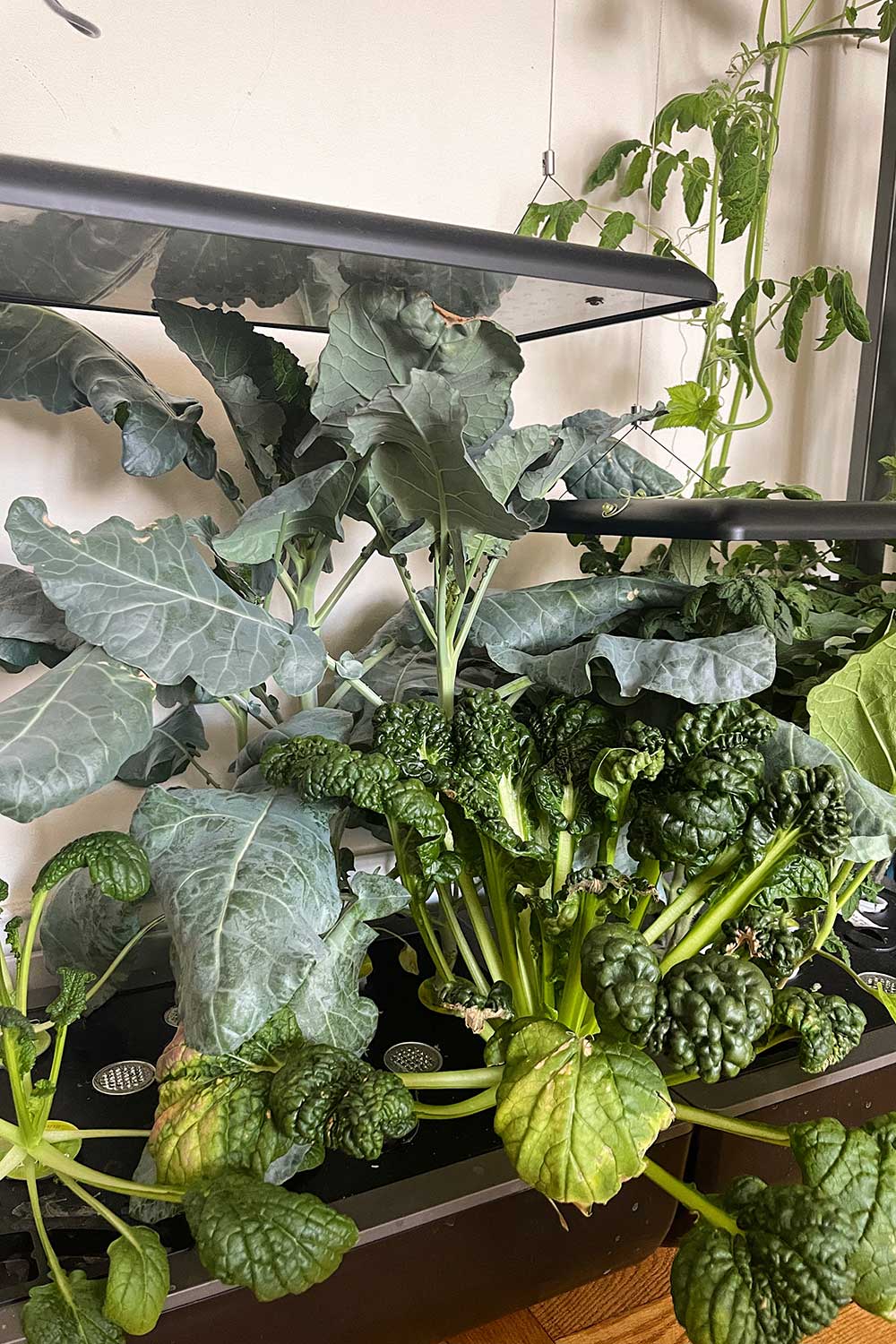Chijimisai is a hybrid Asian green that’s packed with nutrients. It’s easy to grow, easy to cook and tastes similar to spinach! Here’s everything you need to know about this fun shriveled green.
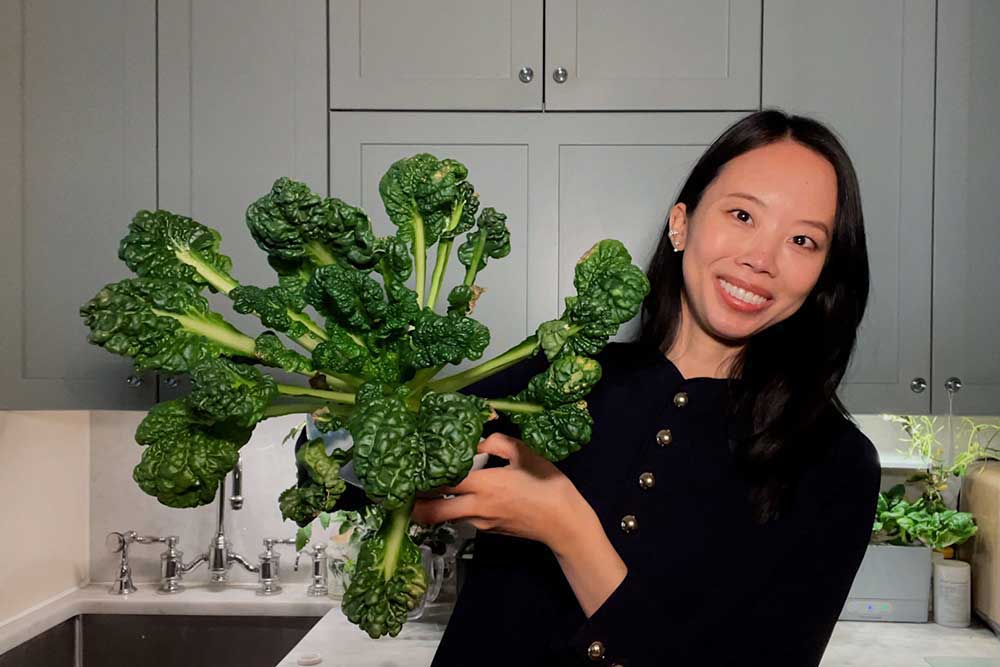
chijimisai I grew inside my apt using my Aerogardens!
Chijimisai
Chijimisai is a Japanese green from the brassica family.
Chijimisai is actually a cross between Tatsoi (another Asian green) and Komatsuna (Japanese mustard spinach).
Its name translates to shriveled leafy greens, because this mild mustard green looks a bit like wrinkly spinach!
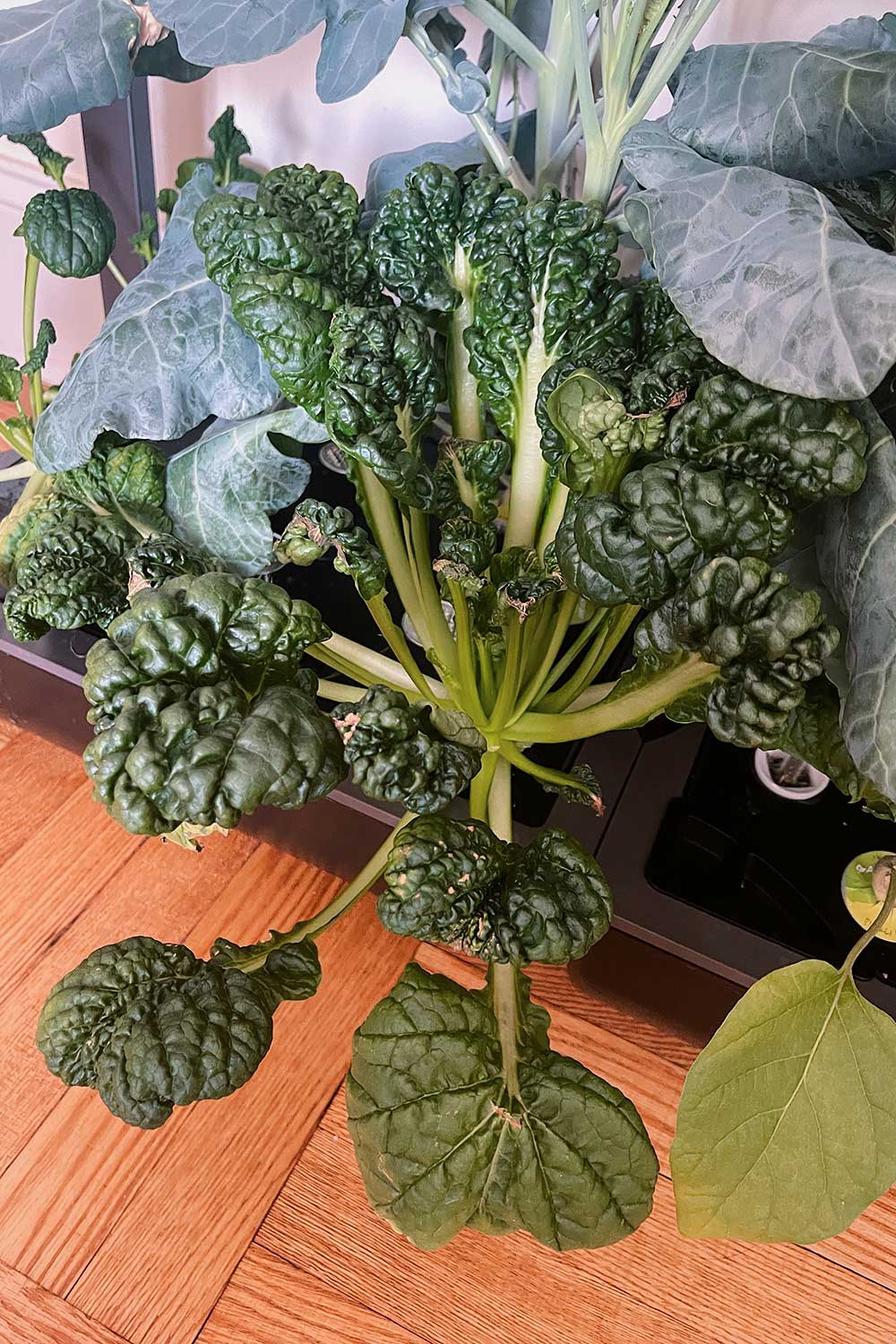
The plant’s dark green leaves have a velvety texture with a light umami flavor.
Chijimisai is great for stir fries, soups and even juicing.
And it’s incredibly nutritious, full of vitamin K, C and A.
In fact, chijimisai has about 4x as much vitamin A as carrots do!
Chijimisai is difficult (almost impossible) to buy at your regular grocery store, so growing it yourself is the best way to have a steady supply.
But luckily, chijimisai is very easy to grow – especially in an indoor garden.
How to Grow Chijimisai
Chijimisai is very easy to grow, like most Asian greens.
It matures in about 55 days and unlike spinach, the plant has a long harvest window.
Chijimisai is also much more heat tolerant and pest resistant than other mustard greens or leafy lettuces.
Because it doesn’t bolt at the first sign of hot weather, you can continue to harvest chijimisai all year round in most growing zones.
For asian vegetable seeds, I recommend buying from True Leaf Market.
I’ve bought asian seeds from many seed companies, but they have the most authentic versions of traditional asian veggies!
Buy seeds: Amazon, True Leaf Market, Etsy
Chijimisai Grow Guide
| Botanical Name | Brassica rapa |
| Common Name | Chijimisai |
| Mature Size | inches tall |
| Days to Harvest | 55 days from seed |
| Light | Partial sun, shade |
| Soil Type | Rich, well draining soil |
| Soil pH | Slightly acidic to Neutral (6.0 – 7.5) |
| Hardiness Zones | USA Zones 4-7 |
| Native Area | Asia |
| Pests | Slugs, snails, beetles |
| Diseases | Downy mildew |
Best Indoor Gardening Products to Grow Chijimisai
Indoor Gardens
Use Your Own Seeds
Aerogarden Discount Code
Use SSG15 for 15% off any order of $50+
Growing Chijimisai Hydroponically
I’ve been wanting to grow more Asian greens and ordered a bunch of seeds to grow indoors in my hydroponic garden.
Chijimisai was incredibly easy to grow, similar to baby bok choi and tatsoi!
I usually plant 1 seed per pod, so that the chijimisai has enough room to grow outwards like a blooming flower.
It sprouts very quickly.
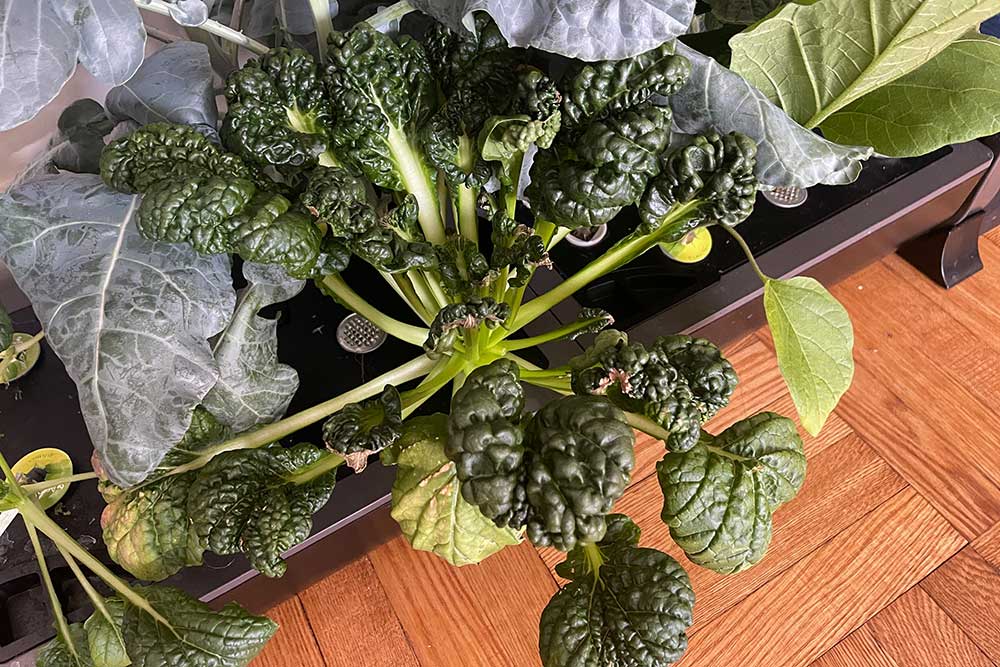
How to Harvest Chijimisai
Chijimisai is meant to be harvested one time, once the plant is full grown.
But you can also harvest the outer leaves of the plant using the ‘cut and come again’ method. Just break off any outer lying leaves and make sure to leave the center intact.
What to Look for When Buying Chijimisai
I’ve never seen chijimisai at any grocery store near me (even the Asian grocery stores in Chinatown and Flushing) so if you find it, you’re in luck!
The stems of chijimisai are crunchy but delicate, and break easily.
Look for dark green leaves with firm stems. Avoid any wilted or yellowing leaves.
How to Store Chijimisai
Because the long thin stalks of chijimisai are so delicate, I recommend harvesting the plant’s outer leaves as needed (or the entire head) right when you want to eat it.
But, if you really want to store chijimisai, you can.
To store this delicate Asian green for as long as possible, cut each leaf off individually. Then bundle all the leaves together in a damp paper towel.
Place it in a plastic bag and store it in the crisper draw of your fridge. It should last at least 3 to 5 days.
If you bought a whole head of chijimisai from the grocery store, separate the leaves, wash it well.
Again store the leaves in a damp paper towel in a plastic bag in the fridge.
more hydroponics + recipes on tiktok @shershegrows
How to Cook Chijimisai
Chijimisai is a tasty green – it doesn’t have that overly ‘chlorophyll’ taste but a more mild mustardy light flavor.
The leaves have a nice firm texture, so it’s great to add in soups and stews.
Or, simply stir fry it with some salt and pepper, or a soy sauce mixture.
You can even juice chijimisai!
For more ways on incorporating chijimisai and cooking Japanese dishes, take this Masterclass on Modern Japanese Cooking!
Chijimisai Recipes
coming soon!
Follow me on

